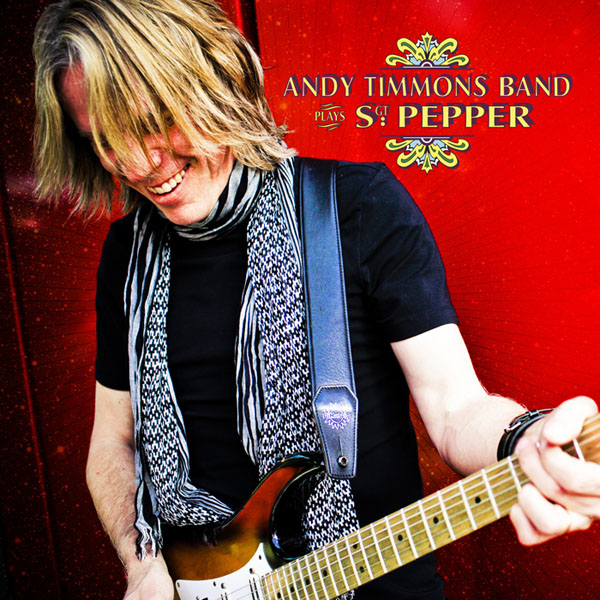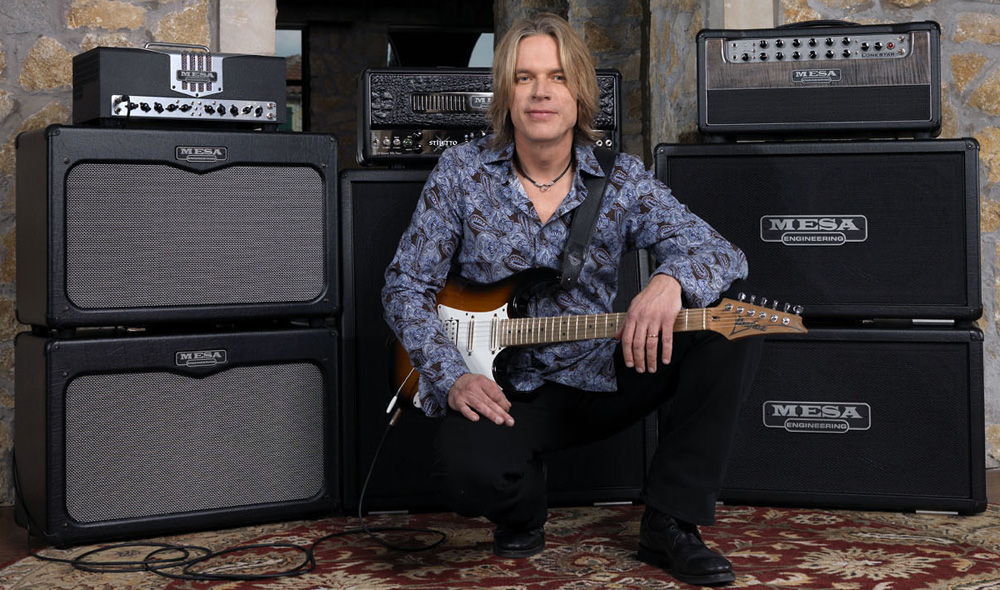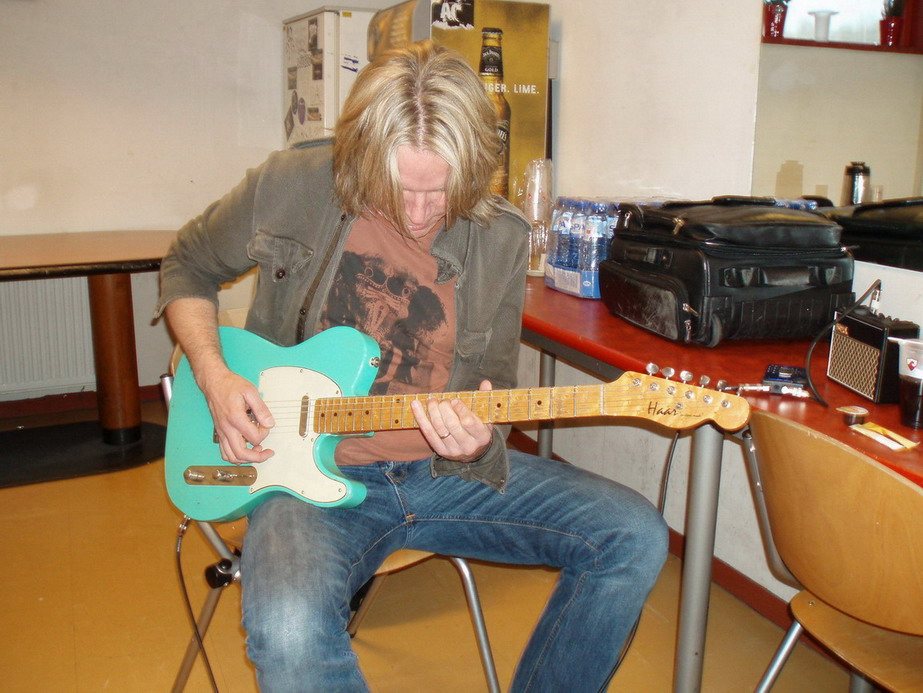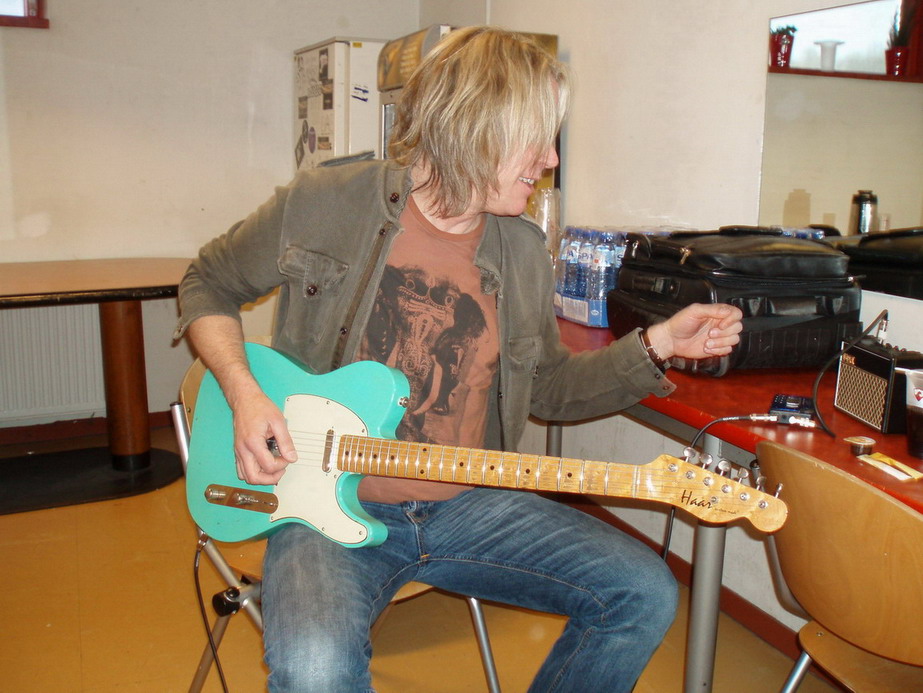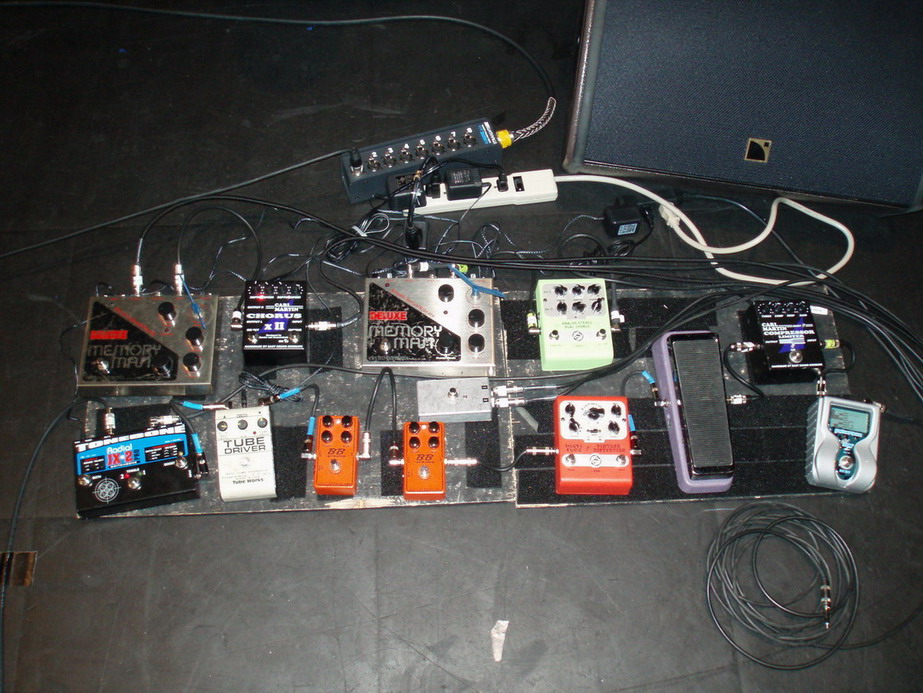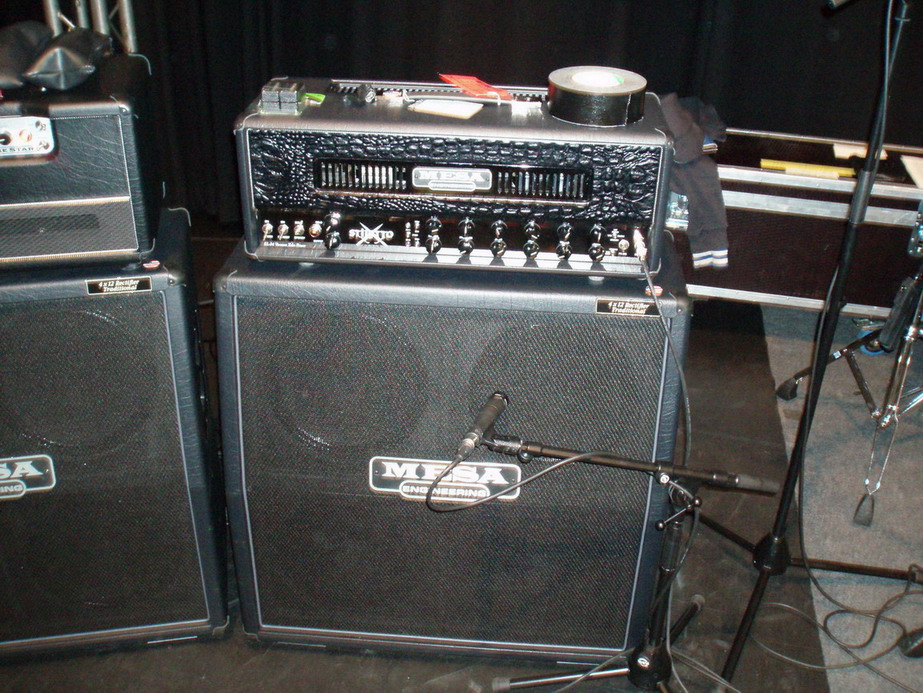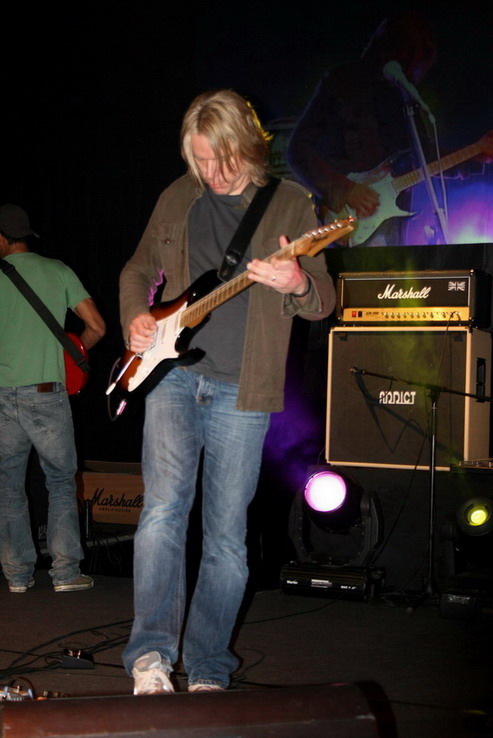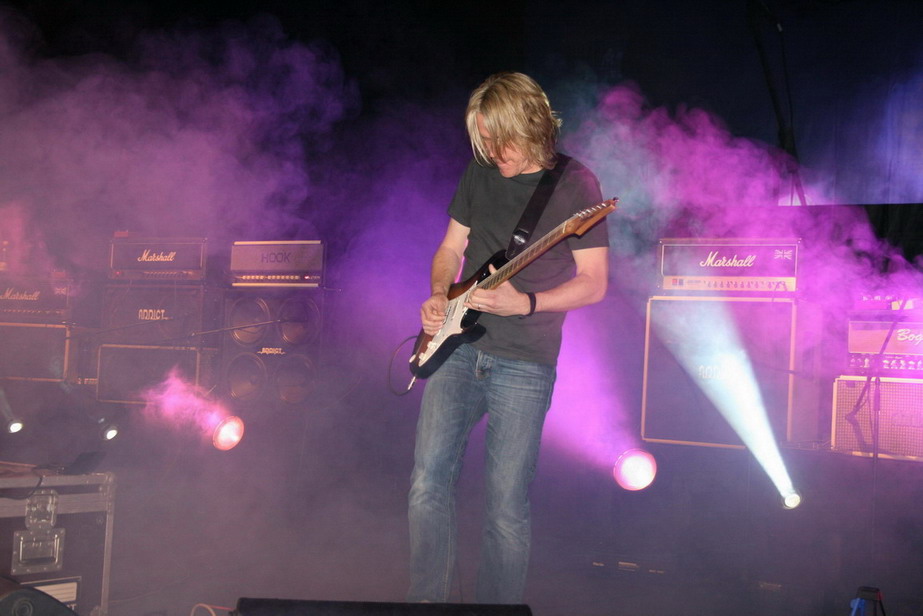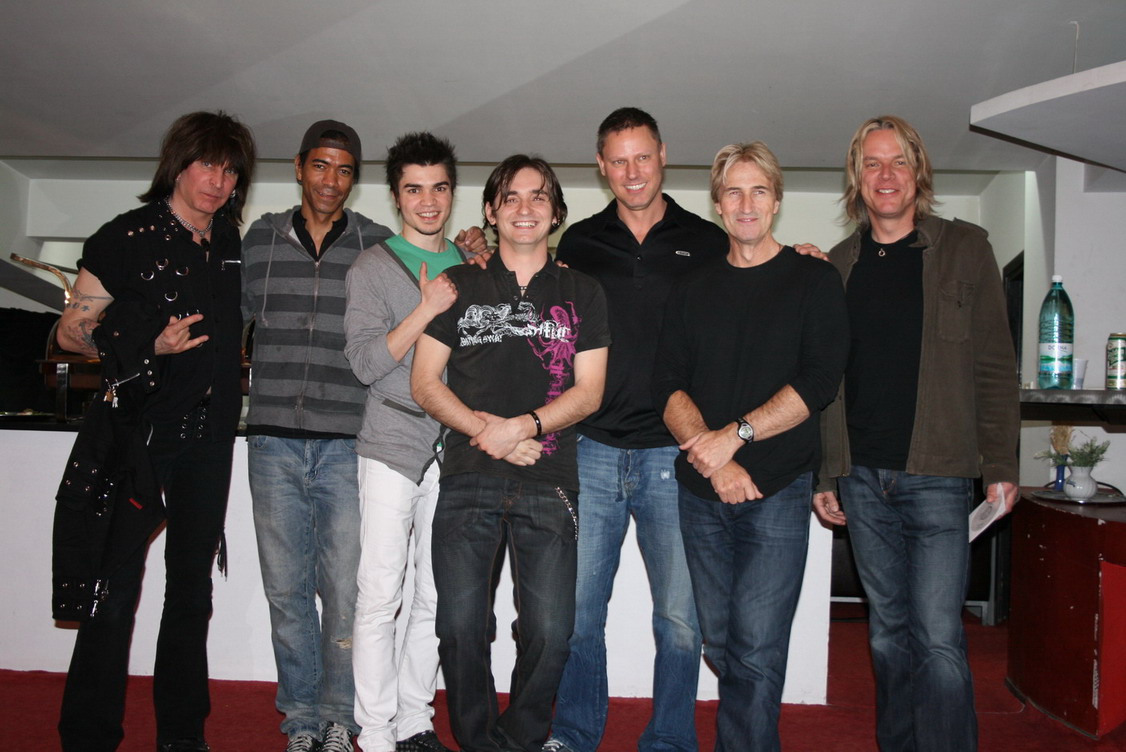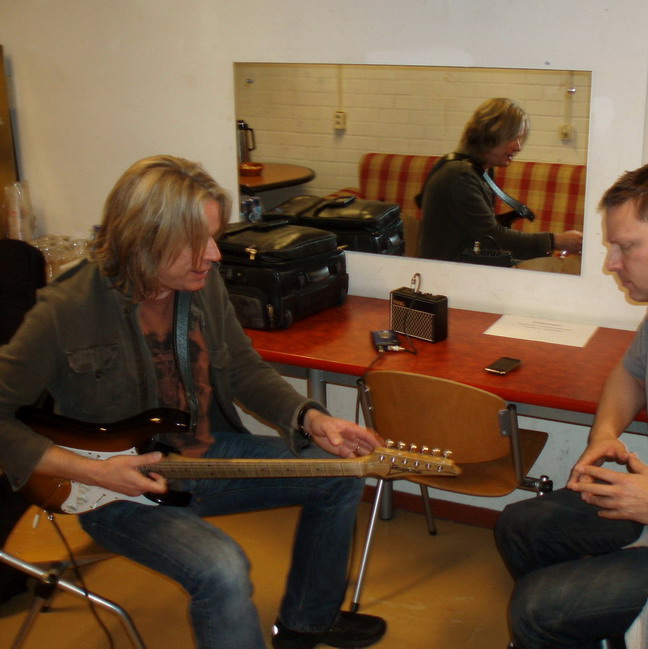I had this conversation may 14th 2010, with Andy at the The Boerderij in Zoetermeer during Andy’s European tour. Manager Riccardo Cappelli was kind enough to make some space in between a busy schedule, so we had enough time to sit down and relax for a bit. We had played together just a couple months before at the Ziua Chitarelor II guitar festival in Bucharest. So this interview started out with a little conversation about that fun gig.
Photos by Richard Hallebeek
:: The event was really well-organized and everything went smoothly.
Organizer Corrado Sgandurra is really continuing to promote and.. yeah it’s pretty neat man.
:: Corrado is a great organizer. We were able to focus on making music and get comfortable with each other and he takes care of the rest.
Yeah, he did and the scope of what he did is really difficult to pull off, I mean.. financially too. Obviously he has had some help from the government. And every player had something unique to offer. And being around Michael (Angelo Batio) too, I’d seen so many clips of him and I’d seen a clinic that he had done back in the 80’s for.. what was the amplifier company.. Randall. But when you see him do some of this live and everything and the personality that comes through, it was really entertaining. It was great. He played his ass off man! (laughs) It was great seeing him on his regular guitar. ‘Cause you’re so used to seeing all the..
:: Yeah, he can really play, also in a regular way.
Yeah, really. My respect grew immensely for him.[Andy plays his ‘rehearsal room’ practice setup with a little Korg Pandora’s Box and a small practice amp, and plays some jazz lines]
:: Cool.
Yeah, this is my little practice ‘away from home’.
:: So how’s this tour been so far?
Well, very short so far (laughs) this is only our third gig. We’ve been to Italy a month ago and with us all this time, we have three different drummers that we work with. The guy playing with us on this tour is a guy named Rob Avsharian. He’s only done one other tour with us, which was also Italy back, maybe two years ago. He’s got a great flair at what he does, but we’re still kinda finding our groove a little bit and coming together, but it’s been exciting. It’s also nice to have somebody fresh. It kinda changes things up a little bit.
:: How many gigs are there?
That’s a good question. I think there’s only like 10, 11 gigs.
:: Three drummers for ten gigs, that sounds extravagant!
(laughs) oh yeah, exactly. It’s just who ever is available. Because, I mean you know how it is we’re not always touring, so everybody does a lot of different things. The drummer Mitch Marine, that’s my original drummer from, when we started playing in 1988. He’s with Dwight Yoakum. He’s very well knows, kinda country artist in America. Really great kinda roots-country. So he’s busy with him and my other drummer Dan Wojciechowski is on tour with Peter Frampton right now and so.. whoever is available, you know. We’re lucky we’ve got some really great players, but it’s always Mike Daane on the bass. He’s excited to be here. I think he has some heritage. As do I. My wife’s maiden name is ‘Otto’. The Otto family from Amsterdam, so maybe coming tonight, my cousin. (laughs) It’ll be good.
:: Besides finding the musicians, I think it’s pretty hard to do a tour anyways nowadays.
Well, sure. Absolutely. Obviously. We’ve been pretty blessed, there’s a guy named Riccardo Cappeli, he’s been bringing us to Italy now. He started as a writer for one of the Italian guitar magazines. He just got fed up with some of his favorite players not coming over, so he just started inviting people and figuring out where to book them in certain clubs. And got Greg Howe over and Richie Kotzen, and.. he brings people like Tommy Emmanuel down, a lot of different people. So he got a hold of me and said do you wanna come and play and I was ‘yeah!’ For me it’s like, anybody that asks me to come and play, I’m gonna come play, you know.. hell yeah I wanna play, so..now we’ve had some successful tours there and started to try and branch out and that’s why we’re here. Just trying to get the foot in the door and to see what we can get going.
:: What’s happening at home, what are you doing? Do you still do session work?
Yeah, it’s been.. the session work has been down quite a bit. There is no doubt.. when I was first living in Texas in the late 80’s, there was lot of session work.
:: You were quite busy I guess.
Yeah, there was a lot of radio and television, jingle work and independent record projects. Some national stuff would come through. But.. then I moved to New York when I joined Danger Danger and that’s in ’89.. and after that kinda fell apart in 1993, I was just starting to get my foot in the door of the New York session scene. But I really missed being back in Texas and I was kind of a bigger fish in a smaller pond there. So I moved back, you know, plugged back into the sessions that I was doing and I was really busy for a good while but.. obviously with both economy and technology, everybody’s got a studio in their home now..
:: Yeah, everybody has something to record on and it always seems to be good or near-professional equipment.
Yeah. So the session work I tend to do, it’s more just.. people doing record projects, you know. And I haven’t really exploited the internet as far as session work goes. I know there is quite a scene there.
:: Webcam lessons maybe? I’m sure there is always somebody, somewhere in the world that wants to take lessons from you.
Yeah, webcam lessons or really just you know, people sending you files to play on. I could probably do more of that, but I really haven’t exploited it so much.
:: There’s a lot of players doing that.
Yeah, and that can be a great thing. I’ve been lucky though that ever since I was doing the Olivia Newton John thing, for a long time I was her music director and guitarist for about ten years, but she started to slow down over the last couple of years. Which was kind of a blessing because then I had you know, that was kinda my ‘money gig’ and then I could just do my own thing when I had the time. But when that started going away, I became a little bit more motivated. And honestly too, a lot of it is just..you know when the opportunity it’s there, it seems.. things kind of happen. If that makes sense. Even without necessarily making a specific effort, things kinda just come, in a certain way. You have a certain faith that maybe it’ll happen, you know things for my own career, but really have kind of been gradually taking off. Probably the conversions of.. that slowing down and the internet. The more and more things can happen through You Tube or whatever. I mean, that’s the MTV and the radio station of today, that’s really our only.. our main source of promotion. Especially the music that we’re doing, the instrumental-based stuff.
:: One gig that would have been perfect for you, to introduce you to a broader audience, would have been the G3 gig with Satriani and Vai. They did a couple of shows with you in the States, but why didn’t they do a world tour with you? You play instrumental blues-rock that fits the G3 package well and besides that, you also are an Ibanez endorser, so the whole package seems to just be just right.
Yeah. It’s interesting and I get asked that a lot ehm…. whenever the G3 guys come through Texas, they invite me out, so I’ve gotten to play with them, but it’s never for a full tour.
:: I would love to see you do a full tour with G3.
You know, it seems to be a catch-22 thing and Joe’s been, both Joe and Steve have been really supportive of me for a long time and those guys were, certainly early on were influential to me. But I think it’s really market key-value. They’ve had Yngwie and Eric Johnson and these guys are a lot more famous then me. So obviously, if I were to get on the tour, it would be the perfect demographically, the right crowd to get in front of. But they need somebody that’s gonna sell more tickets I think. I think it’s really business, you know. I think on a respect or a friend-level they would like to have me out there. So I’m hopeful that that’ll happen as things continue to slowly build. If they continue to slowly build, we hope anyway (laughs)
:: What’s the last thing you released?
The last thing was 2006, was the ‘Resolution’ cd. Then we did the live dvd from that. Basically recorded the record-release show in Dallas and eventually got around to mixing that and putting it out.
:: That dvd sounds really good. Of course you want to make a live music dvd sound the best you can. How did you work to get that done?
Of course. Yeah, the guy that recorded, has recorded nearly every one of my records, so..
:: Someone you can trust.
It was the live sound engineer, yeah. And he.. he organised the whole thing and he tracked everything, you know. So it was pretty easy to get it sounding good.
:: Then for a full house, invite all your friends?
Yeah, it was a great crowd. We’re home town there in Dallas, but we don’t play that much there. So we do our show maybe 2 or 3 times a year. So yeah, there was the excitement about the record coming out. So yeah, that all turned out great, we ended up just releasing that just on the website-only.
:: Oh really?
That’s another curious thing these days, is trying to figure out business-wise what’s the best way of going about things. I’m not sure.. we’re actually in the process, I’ve got records I’m working on simultaneously, and the one that will be completed first is.. I did an arrangement of the entire Sgt. Pepper record. We’ve been doing a version of Strawberry Fields live, and we’ll do it tonight..
:: Is it gonna be all-instrumental or will you sing on a couple of tracks?
All instrumental. And with kind of the same concept as the Resolution cd, where there’s no overdubs. So the arrangements I came up with, had to be kind of..you know all encompassing with orchestration. Get the melodies and the chords and.. it was just a lot of fun going down that path like I’d gone with Resolution. It’s been kind of inspiring me, ok.. could I do it?
:: Will it be in trio format?
Yeah, completely as a trio, yeah. So it’s been a lot of fun, but it’s… at first I thought ok this is kinda crazy. But we had this one song, I said; this really sounds great and then it gets a great response every night, of course it’s Beatles. Everybody connects with it. So that’s what got the wheels turning and..to see if I could..I just kept working on song by song and it took a couple of years of just kinda picking out.. and then I finally figured, this might work. So we’ve got that nearly finished. I’ve got a couple of tracks�
:: But you’re doing the entire Sgt Peppers album?
Entire Sgt. Pepper plus Strawberry Fields. If you’re familiar with the history, Strawberry Fields and Penny Lane were actually the first two songs recorded for Sgt. Pepper, but the EMI label needed a single. So they took those two songs, so.. from there, then they recorded ‘When I’m 64’ and finished the rest of those tracks. So I kind of associate Strawberry Fields as being a part of that. That’ll be part of the collection.
:: Speaking about the trio, you have been working in the power trio format for quite a while. It has become kind of your ‘signature band sound’ and you are quite good at playing in that format, while it’s not always easy for a guitar player.
Yeah, as far as my own music yeah. In the past we produced the traditional rhythm guitars and stack everything. Some keyboards and doubling the melodies and stuff, and it’s a cool sound. But when it was.. when I delivered the ‘That Was Then, This Is Now’ cd to Steve Vai’s label, it was the first release on Favored Nations from me. It was kind of a ‘best of’ Ear X-tacy 1 & 2. And then he wanted four new songs. So we recorded four new songs. And there were certain sections on a couple of songs where it was just trio. And Steve had made a comment to me, after hearing those: ‘I love the sections when it’s just one guitar you know, you can really hear the fingers on the frets’, and.. we were working on Resolution, I was approaching it the same way where I went in with a band in the studio and I was playing some rhythm and some.. and some lead guitar. But I was just so uninspired, I was like, this.. it’s been done. This instrumental rock guitar thing, it’s just.. and Joe and Steve having you know, been the pinnacle of that, everything just.. as soon as you have rhythm guitars and start adding melodies, it sounds like Joe Satriani.(laughs) At a certain point, you know?
:: Yeah, I know what you mean.
So.. but I thought about what Steve had said and kinda thinking of him as like an older brother, you know. Which was always kind of the thing for me. I started playing guitar because my older brothers played guitar. So I always kinda wanting to impress them, so here is Steve.. my ‘older brother’ and I thought, well what if I could do a whole record like that? Just strictly trio and I’d never done anything like that. That got exciting you know, as far as.. how am I gonna voice the tunes, especially with a rock guitar tone. It’s a delicate thing, how to..
:: Play chords in a trio..
How to play chords and how not be just so muddy, you know. That really got interesting finally for me; this is the way I can do it, it can be new for me anyway. I mean, Eric Johnson has been doing that kinda thing for years, he’s a whole other level, but.. so it got exciting and that’s the way I’ve been approaching it since. And so these next records are kind of in that vein as well.
:: Instrumental guitar rock is kind of a dinosaur. It’s hard to do something new with it.
I know it! I think so. But honestly the thing that tends to be the most missing element was just really good melodies. You know what I mean? Had there really be some songs there..
:: You have some great melodies and riffs , the audience went crazy in Bucharest just when you started a riff of one of your songs.
Yeah, I mean just a simple thing.. there’s a really good.. have you heard Jeff Beck’s new record?
:: Yes.
Ok.. I think it’s his best record. But I know your taste and if you’re looking for the fusion Jeff Beck it’s not quite that, but it’s.. it’s the way he plays one note [Andy plays one note on his guitar, a ‘D’ on the 7th fret on the G string] and then he just connects it in a certain way.. it’s the most emotional record he has made. And his use of.. I finally got this under control, I finally set my tremolo up towards floating a bit. ‘Cause my guitar, for the past 16 years..
:: This same guitar?
Yeah, this is my main guitar, they’ve built this in February of..what’s the serial number.. [checks serial] February 14th of ’94, so Valentine’s day (laughs) but I’ve been using the Floyd Rose with [imitates dive bombs] and all this stuff and I just wanted to hit the guitar and have nothing move (laughs) just wanted to [plays bluesy pentatonic double stops on his guitar] I just wanted that connection. And I love that. But you’re doing it, as far as vibrato and all the bending, everything is done with the fingers [plays some bluesy lines with tasty vibrato only the way Andy can] which is good. But there’s something about that floating tremolo where you can hold the note and you go up and down.
:: It’s a different sound, yeah.
And so. . Jeff’s record came out and then I saw him live, it was in Dallas about three weeks ago. And he just.. he kind of makes everybody else look kinda silly (laughs). It was that beautiful.
:: He has a lot of control.
He has so much control and.. it was just sheer beauty and it was so inspiring. And the great thing about that is that he’s 65 or 66 and he’s much better now then he’s ever been. There’s no doubt that he just kinda keeps getting better. So.. there’s hope! (laughs)But I think with the instrumental guitar thing.. and Jeff got there..you know, I kept thinking that’s level of connection and expression hadn’t really been happening, except for maybe somebody like Pat Metheny. I a different way, you know, but the way.. there’s something about a bent string and vibrato that can, that.. it’s singing, it’s more vocal, you know. You can tell Jeff’s been listening to singers. And I know that Jeff’s been a big influence on Scott, you know what I mean. You can really hear when Scott started getting into Beck’s thing.
:: I know you listen to a lot of melodic vocal pop and rock music yourself, like Coldplay and Foo Fighters for inspiration for vocal-like melodies.
Yeah, exactly. The reason I like Coldplay ’cause he’s been influenced I think by Brian Wilson. And he is one of my favorite composers.
:: Coldplay singer Chris Martin hits a lot of cool notes against the chords, that’s right.
Yeah, it’s just the right notes. And that’s.. for any instrument that’s kind of what it’s all about it seems like, you know. What note over that change is gonna have that effect or how are you gonna reach and connect with the audience, you know. And there’s certain composition.. I mean The Beach Boys are kind of known for [plays rock ‘n roll riffs] but the melodies.. [plays chord melody to ‘God Only Knows’ and hums melody] and Brian’s falsetto, the way he would hit the note, it just had this wonderful quality to it. I’m trying to get to that level with the instrument. That would be I think the goal for me at this point. And just keep picking away at it.
:: How do you write your songs from that standpoint? Where do you write?
It happens anywhere. It’s usually when I’m trying to practise. Practice doesn’t last very long but it always ends up in some songwriting, you know.
:: Ah, but that’s good!
It’s always that first time of the day when you pick up the guitar before your mind clicks in and you just start playing.. and something happens and exactly.. you got your iPhone, or I got this little Tascam digital recorder and yeah, I capture the idea and maybe work from there. But it can happen, you could be driving down the road in a car and, I have so many melodies in my answering machine (laughs) before we had all these devices.
:: Do you have home studio setup?
Yeah, I do, I’ve got Nuendo on my computer and I still have my old O2R board, I haven’t given up faders yet. I like faders. It’s still foreign to me, so I’m a little old school when it comes to that. But I just keep recording little sections of tunes and I’m trying to develop it. But no particular set way. You can sit down and make an exercise out of it, you know.. I’m gonna write a song today, what am I feeling, what key do I choose..
:: That doesn’t work.
It can be done. Sometimes when I do master classes I’ll talk about my melodic gear and how I hear things about.. it’s not so much about scales but more about, just be aware what the chord tones are over the chord changes. And then using whatever color tones around that to create the melodies and etcetera. Sometimes I’ll have everybody write down a random chord on a piece of paper send it around, and you collect them and come up with some chord progression and sometimes some really amazing things happen and sometimes it’s difficult to tie it together, but.. for me it just always seems to be the divine inspiration that comes from somewhere, you’re channeling something. I certainly thing we’re a product of everything we’ve taken in. There’s no doubt there’s a library in there. And that’s were some people get in trouble with litigation (laughs) they may not be aware that they’re just reproducing something, that they’ve heard before. But there’s no doubt the things that means to most to us, whatever that connects with us so heavenly along the way, that tends to be where were our ear guides us.
:: I think we take in our influences at an early age, until we’re 18 or maybe 20 years old. After that age, you can add some icing on the cake, but it’s hard, if not impossible to truly take in a brand new style. We always go back to our ‘roots’ which is the music that we grew up with and is in your soul, your system, your heart.
There is no doubt, I’m a product of the 60’s and 70’s, so I still continually go back. Luckily it was a particularly creative period in time [laughter] .. and growth. When you think about ‘Love Me Do’ to ‘Strawberry Fields’ , this was only 4 years. [plays the chords to both songs] It takes some people 4 years to do a record, you know. It’s pretty stunning and Hendrix coming after that.
:: You told me about the new tuning pegs on your Ibanez and the discovery it was for you a while ago.
Yeah. I had the Sperzels on for 16 years. And I think they worked pretty well, but I was always having certain tuning issues and even intonation issues. Ibanez was great. They suggested these tuners at one point.
:: So.. reveal the mystery.
It’s little more cumbersome. It’s basically a straight Fender-style tuner, but you put the string thru and as you tighten it, the piece kind of tightens against itself [shows tuning peg on guitar] it’s self-tightening. And then you take a little screwdriver and just tighten it a little bit more.
:: What’s the brand?
Oh, it’s Gotoh, I’m sorry. The tuning ratio is 16:1 as opposed to 12:1. So that makes it more accurate, they’re a lot lighter, because when you have the bulky tuners on the back..
:: They’re pretty bulky, yeah.
Yeah, and I think it’s even sonically. I’ve got the idea that maybe the sound’s better. But I’m having less tuning problems live, too. I still tune between every song, but it’s not really that drastic. I still wanna see Eric Johnson or Jeff Beck.. I rarely see.. they just play all night and they’re not tuning.
:: .10’s on your guitar?
Yes.
:: What’s your pickups?
These are all Dimarzio now. These are Cruisers, Dimarzio Cruisers. The original pickup in this guitar was a Jeff Beck. That I had in up until two years ago, but I did another signature guitar for Ibanez, that we developed a custom humbucker that’s called the ‘AT1’. My Jeff Beck finally died, so I finally replaced that pickup, I like this even better then the Beck, I should have put it in a long time ago.
:: So how did this signature pickup develop?
It kinda started of as the Jeff Beck kinda thing and then we worked on it with Steve Blucher from Dimarzio. And I love it. It’s my kinda pickup.
:: Any other stuff your coming up with for Ibanez?
Now? I think the next version of my guitar will have the Gotoh’s (laughs), sorry Sperzel, but it’s working better! Nothing really new, I mean.. there was a time where I split with Ibanez for a while after we did the 8300 which is that Mahogony guitar with the rosewood. I was at a point where I just kinda.. I liked the Ibanez, it’s great, but I just kinda wanted to play whatever I wanted to play. I didn’t necessarily wanted to be restricted you know, I love Fenders, I love strats and tele’s, I mean I love all guitars, basically. And so I started looking for the ultimate strat and I’ve got several you know, and they’re all nice and they play well, there’s certain things. But I just kept coming back to this guitar. It’s just kind of a hybrid of all the things that I like. It was about that time that Ibanez came back and said: what would you do if we maybe thought about re-releasing this guitar? ‘Cause originally, they’ve only made about 300. I think it was a little too strat, for Ibanez. But is decidedly different. They’re very narrow but rounded, so it’s very comfortable. [hands guitar for me to play ]
:: That feels comfortable, yeah.
It’s probably a bit narrow for you, but..
:: Do you have the Buzz Feiten tuning system on here?
No. I’ve tried that. It solves some things, but I think it doesn’t solve everything. It’s a very cool concept.
:: Can you tell something about your current rig?
I think when I was in Romania I had the GCX switcher�
:: I think you just had a Marshall there.
All right, just a Marshall.. I wasn’t switching, was I? That was just a loaner. Normally when I’m using the Boogie rig I’ve got a Stiletto, which is the Marshall-ish kinda side. Then I got the Lone Star and so I was switching between those using a GCX, a little patch rack you know, 8 channels of different things you can do with it. So switching between the amps and switching channels, different pedals.. that finally died. It was always causing trouble anytime I came to Europe. It was always causing ground loops and then when it took a hit it would be fucked up. So now I’m doing everything with an A/B box and lots of pedals with no presets. So I’m like.. this is not my best rig (laughs) I’ve been tap-dancing a lot. [plays some serious blues licks]
:: You live in Dallas. Did you ever get to play with Stevie Ray Vaughan or meet him?
No. You know, it’s one of my big regrets, it’s that.. never did I see him play, never did I meet him. He grew up south of Dallas. I know a lot of people that did grow up with him and were in his first bands. So I kinda feel like I’ve gotten to know Stevie over the years by the people that he grew up with. I just can’t believe that I never saw him play.
:: Last year you did the SRV remembrance.
Yeah. There’s this guy that put up these memorial concerts for Stevie. So we played and Lance Lopez played, who is really great. I saw Lance play when he was 15 or 16, he’d used to hang out at the clubs we played. We sounded like Stevie back then..there’s obviously a school of guys that came up kind of playing that style. But nobody really.. they’re all playing like Stevie and nobody really well, but.. when you watch that Live At El Mocambo DVD, that’s just.. there’s just something there man. It’s indefinable.
:: Do you like the new blues guys like John Mayer, who is very inspired by Stevie?
It’s definitely very inspiring, he’s very good. He’s a great songwriter, he sings really well.
:: He’s a guitar player and gets all the chicks.
He’s a good-looking guy, there’s no doubt about that! [laughter] Maybe that’s why I have a little thing about him, he’s too good-looking (laughs), but serious, he is really great. His music hasn’t connected with me yet. And it may be an age thing, were you were just talking about, we tend to go back to the things that initially inspired us.
:: And for example, Joe Bonamassa started out with..
Now, that’s a different thing. Joe Bonamassa and Derek Trucks, those two guys..
:: They started out with Texas Blues and now play more English blues, Peter Green.
Yeah, absolutely. They sound unique to me. John is still young, but Derek has such a lyrical style with his slide playing. There is no doubt, I was so blown away when Texas Flood came out, I was just driving in my ’71 Nova and I literally pulled over when Texas Flood came on the radio. There was nothing like that at the time. And being a white kid in Indiana, I just didn’t have the exposure to the blues beyond BB King, he kinda was the closest thing to mainstream blues. So of course everything Stevie did, I was a big fan of, but I didn’t hear Albert King ’till about 1990. This guy with Ibanez, a guy named Chris Kelly realized I’d never really heard some of the early blues stuff. So he’d send me this cd that had like everybody on it, Albert and Freddy King, all these different guys. And there was one Albert King song and it didn’t even have a guitar solo, it was a song called ‘Personal Manager’, but it had one V-IV turnaround in the middle where he just went [imitates slow bend] he just did that bend, that’s Stevie, that’s that sound! So it’s obvious how he collected Jimi and Albert and all these guys. But when he did it, it was his own thing. And that’s what these younger guys, they gotta listen to more then Stevie. Otherwise it’s just gonna be that.
